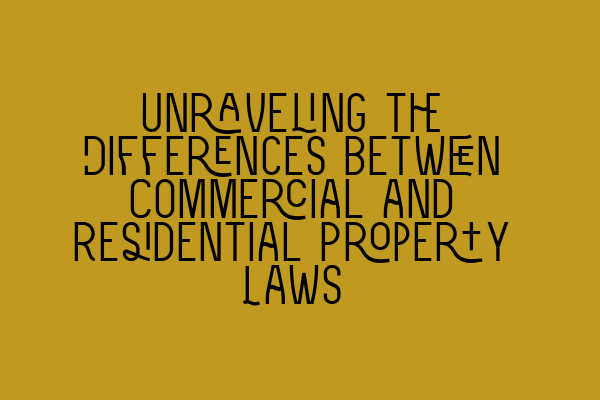Unraveling the Differences between Commercial and Residential Property Laws
If you’re entering into the world of property law, it’s essential to understand the significant differences between commercial and residential property laws. Commercial and residential properties have distinct legal requirements, rights, and responsibilities for both landlords and tenants. In this blog post, we will unravel the key variations between these two branches of property law, providing you with a solid foundation of knowledge to navigate the legal landscape.
1. Definition and Purpose
Commercial properties primarily serve business purposes, such as offices, retail spaces, industrial units, and warehouses. On the other hand, residential properties are designated for individuals and families to live in, including houses and apartments. Understanding the purpose and distinguishing features of each type of property is crucial for any property law professional.
2. Legal Framework
Commercial property law is generally more complex and governed by a comprehensive set of regulations. Commercial leases, for instance, tend to be longer and contain detailed provisions regarding rent, maintenance, repairs, and responsibility for outgoings. Conversely, residential property law is more consumer-oriented, with an emphasis on protecting tenants’ rights and ensuring suitable living conditions.
3. Leases and Tenancy
Commercial leases often have longer terms compared to residential leases. Commercial leases commonly span several years, while residential leases are typically shorter, usually one year or less. Additionally, commercial leases often include rent reviews at regular intervals to account for market changes, whereas residential leases may include fixed rental periods.
4. Rent and Rent Control
Rent in commercial properties is usually higher than in residential properties due to the potential for commercial ventures to generate more significant profits. In some jurisdictions, residential properties are subject to rent control measures to protect tenants from exorbitant rental increases and maintain affordable housing options.
5. Eviction and Termination
The eviction process for commercial tenants is typically more straightforward and faster than for residential tenants. Commercial landlords have stronger eviction rights, which can involve forfeiture of the lease or terminating the tenancy without much notice. In contrast, residential tenants are provided with more protection, including notice requirements, eviction procedures, and governmental oversight.
6. Repairs and Maintenance
Commercial tenants generally have more responsibility for repairs and maintenance compared to residential tenants. Commercial leases often include clauses that make tenants responsible for all repairs, maintenance, and even capital improvements, depending on the lease terms. Residential leases, however, typically place the duty of repairs and maintenance on the landlord unless the damage is caused by the tenant’s negligence.
7. Consumer Protection
Residential property law places heavy emphasis on consumer protection, ensuring tenants have the right to habitable living conditions and protection from unscrupulous landlords. The law often mandates specific standards for safety, structural integrity, and utilities in residential properties. Commercial property law, while still subject to general laws and regulations, may provide fewer protections as commercial tenants are typically viewed as more knowledgeable and capable of protecting their own interests.
8. Legal Advice
Given the intricate nature of property law, seeking legal advice is highly recommended for both landlords and tenants, regardless of whether it’s a commercial or residential property. A competent property lawyer can provide valuable counsel on lease negotiations, drafting agreements, resolving disputes, and ensuring compliance with the law.
To sum it up, commercial and residential property laws differ significantly in purpose, legal framework, leases and tenancy, rent control, eviction procedures, repairs and maintenance responsibilities, consumer protection, and the need for legal advice. Understanding these distinctions is crucial for all individuals involved in the property industry and can help avoid potential legal pitfalls.
For more information on property law and related topics, check out the following articles:
– SQE 1 Practice Exam Questions
– SQE 1 Practice Mocks FLK1 FLK2
– SQE 2 Preparation Courses
– SQE 1 Preparation Courses
– SRA SQE Exam Dates
By familiarizing yourself with these articles, you can enhance your understanding of property law and prepare yourself for success in this ever-evolving field.
